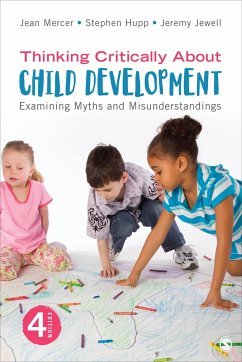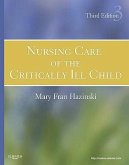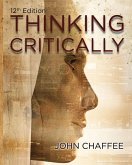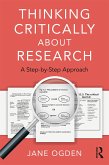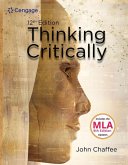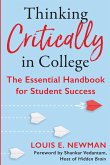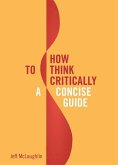Jean A. Mercer, Stephen Hupp, Jeremy D. Jewell
Thinking Critically About Child Development
Examining Myths and Misunderstandings
Jean A. Mercer, Stephen Hupp, Jeremy D. Jewell
Thinking Critically About Child Development
Examining Myths and Misunderstandings
- Broschiertes Buch
- Merkliste
- Auf die Merkliste
- Bewerten Bewerten
- Teilen
- Produkt teilen
- Produkterinnerung
- Produkterinnerung
Containing 16 new claims and misunderstandings, the fourth edition has a greater emphasis on the strategies and practices of thinking critically about child development.
Andere Kunden interessierten sich auch für
![Nursing Care of the Critically Ill Child Nursing Care of the Critically Ill Child]() Mary Fran Hazinski (Professor of NursingVanderbilt University SNursing Care of the Critically Ill Child87,99 €
Mary Fran Hazinski (Professor of NursingVanderbilt University SNursing Care of the Critically Ill Child87,99 €![Thinking Critically (W/ Mla9e Update Card) Thinking Critically (W/ Mla9e Update Card)]() John ChaffeeThinking Critically (W/ Mla9e Update Card)181,99 €
John ChaffeeThinking Critically (W/ Mla9e Update Card)181,99 €![Thinking Critically about Research Thinking Critically about Research]() Jane OgdenThinking Critically about Research53,99 €
Jane OgdenThinking Critically about Research53,99 €![Thinking Critically Thinking Critically]() John Chaffee (City University of New York)Thinking Critically93,99 €
John Chaffee (City University of New York)Thinking Critically93,99 €![Thinking Critically in College Thinking Critically in College]() Louis NewmanThinking Critically in College27,99 €
Louis NewmanThinking Critically in College27,99 €![Critically Reading the Theory and Methods of Archaeology Critically Reading the Theory and Methods of Archaeology]() Guy GibbonCritically Reading the Theory and Methods of Archaeology163,99 €
Guy GibbonCritically Reading the Theory and Methods of Archaeology163,99 €![How to Think Critically How to Think Critically]() Jeff MclaughlinHow to Think Critically47,99 €
Jeff MclaughlinHow to Think Critically47,99 €-
-
-
Containing 16 new claims and misunderstandings, the fourth edition has a greater emphasis on the strategies and practices of thinking critically about child development.
Hinweis: Dieser Artikel kann nur an eine deutsche Lieferadresse ausgeliefert werden.
Hinweis: Dieser Artikel kann nur an eine deutsche Lieferadresse ausgeliefert werden.
Produktdetails
- Produktdetails
- Verlag: SAGE Publications Inc
- 4 Revised edition
- Seitenzahl: 488
- Erscheinungstermin: 28. März 2019
- Englisch
- Abmessung: 231mm x 153mm x 22mm
- Gewicht: 730g
- ISBN-13: 9781544341934
- ISBN-10: 1544341938
- Artikelnr.: 53607549
- Herstellerkennzeichnung
- Libri GmbH
- Europaallee 1
- 36244 Bad Hersfeld
- gpsr@libri.de
- Verlag: SAGE Publications Inc
- 4 Revised edition
- Seitenzahl: 488
- Erscheinungstermin: 28. März 2019
- Englisch
- Abmessung: 231mm x 153mm x 22mm
- Gewicht: 730g
- ISBN-13: 9781544341934
- ISBN-10: 1544341938
- Artikelnr.: 53607549
- Herstellerkennzeichnung
- Libri GmbH
- Europaallee 1
- 36244 Bad Hersfeld
- gpsr@libri.de
Acknowledgments
About the Authors
Introduction
What Is Critical Thinking?
How Do You Think Critically?
Fallacies to Watch for When Studying Child Development
Claims About Child Development
Types of Mistaken Claims
"Seductive Ideas"
Why Is It All So Complicated?
Understanding Basic Facts
Values and Political Goals
Variations on the Developmental Theme
Examining the Evidence: Recognizing That a Belief May Be Mistaken
Sources of Information: Safe or Sorry?
The Work Ahead
What Difference Does It Make If You Can or Can't Think Critically About
Child Development?
Part I: Genetics and Prenatal Life
Claim 1: Genetic factors play such a strong role in human development that
genes alone can determine certain human behavioral characteristics.
Claim 2: Although prematurely born babies are smaller than most and may
need special medical care, the babies and their parents instinctively know
how to interact with each other.
Claim 3: If a child's problem is genetically caused, the problem will be
present at birth and will stay the same throughout life.
Claim 4: Unborn babies are not influenced much by the environment outside
the mother's body.
Claim 5: As the date when her child will be born gets closer, a
mother-to-be needs to be more careful about alcohol and drugs because the
risk of birth defects increases throughout pregnancy.
Claim 6: Assisted reproductive technologies (ART) offer reliable ways for
couples to have healthy children in spite of fertility problems.
Claim 7: Genetic relationships are a powerful factor in social and
emotional interactions, so people recognize and are attracted to blood
relatives even if they have never met them before.
Claim 8: Babies work hard to be born.
Claim 9: When a baby has genetic problems, there are no pre- or postnatal
methods for treatment.
Claim 10: Except for their reproductive organs, there are no differences
between boy and girl babies before or soon after birth. Gender differences
occur as a result of different experiences for boys and girls.
Part II: Infants and Toddlers
Claim 11: There are ideal natural ways for human beings to give birth and
to care for young babies, and methods that are too different from the
natural ways are not desirable.
Claim 12: Parents need to have contact with their babies right after birth
so that they can bond with them.
Claim 13: Babies are born with emotional attachments to their mothers and
can recognize their mothers at once.
Claim 14: When mothers of young babies are depressed, the problem is caused
by the changes in hormones they experience after the birth.
Claim 15: It's been proved that it's always better for parentless children
to be placed in foster care rather than in orphanages or other
institutions.
Claim 16: A baby's sleeping position can cause or prevent sudden infant
death syndrome.
Claim 17: The benefits of bed sharing with an infant outweigh the risks.
Claim 18: Parents should not talk baby talk to their children because it
slows their language development.
Claim 19: Being exposed to two different languages is confusing for babies
and interferes with normal language development.
Claim 20: Babies and toddlers benefit a great deal from being taught sign
language.
Claim 21: It's a problem, and possibly means autism, if babies don't make
eye contact in the first few weeks of life.
Claim 22: It's harmful to preschoolers' psychological development if they
make overnight visits to estranged parents.
Claim 23: Toddlers drop food on the floor because they want to make their
parents angry.
Claim 24: It is important for parents to work with babies and teach them
how to walk.
Claim 25: It is a good thing for an infant or a toddler to have experience
with many caregivers, not just one or two.
Claim 26: Screen devices provide excellent resources for encouraging
infants' and toddlers' mental development.
Claim 27: Using cellphones is an important skill for children growing up
today, and beginning early is the best way to ensure good development and
ability to use electronics.
Claim 28: People who were abused as children are likely to abuse their own
children.
Part III: Preschoolers
Claim 29: Having kids listen to Mozart makes them smart.
Claim 30: The time between birth and age 3 years is the most important
period of development and learning in a person's life.
Claim 31: Children need to hear frequent praise in order to be motivated
toward work and achievement.
Claim 32: Children need to develop basic trust and show it by their
confidence in other people.
Claim 33: If a child is able to complete a task with an adult present, he
or she is also able to do it alone.
Claim 34: Preschoolers who hold their breath when angry are trying to upset
their parents and get their own way.
Claim 35: Vaccines and heavy metals cause autism.
Claim 36: Autism rates are rising rapidly, especially in certain parts of
the country, so something must be happening to cause more cases of this
serious developmental problem.
Claim 37: Preschool children who lie are developing along dangerous lines
and need to be corrected severely in order to stop this bad behavior.
Claim 38: Preschoolers who try to bargain with their parents really want to
manipulate and control adults, and they should not be allowed to negotiate.
Claim 39: A young child can tell when someone is just teasing.
Claim 40: Children with attachment disorders must be treated very sternly
and differently from typically developing children-even in ways that are
ordinarily considered abusive.
Claim 41: Spanking should never be used to discipline a child because it is
ineffective and causes children to model the aggression they experience.
Claim 42: Time-out is harmful to children.
Claim 43: When young children have traumatic experiences, their reactions
are much like those of traumatized adults.
Claim 44: Serious mental illness and criminal behavior are caused by
traumatic experiences in early childhood.
Part IV: School-Age Children
Claim 45: Girls who get their first period early are also likely to mature
quickly in other ways.
Claim 46: Children have different learning styles, depending on whether
they are left brained or right brained.
Claim 47: It's healthy for children to be a little on the chubby side.
Claim 48: Birth order is an important factor that determines children's
intelligence and personality.
Claim 49: When a child is mentally ill, any psychological treatment is
better than no treatment.
Claim 50: Bullying is a natural behavior for children, and there's nothing
you can do to stop it.
Claim 51: Sugar is a major cause of hyperactive behavior.
Claim 52: Adopted children have many more social and emotional development
problems than do nonadopted children.
Claim 53: Adopted children usually turn out to be a lot like the parents
who adopt them.
Claim 54: If a child is sexually molested, he or she will probably repress
the memory.
Claim 55: Children raised by same-sex couples are disadvantaged compared to
other children.
Part V: Adolescents
Claim 56: Regular experience of shared family meals is critical for
children's academic and behavioral development.
Claim 57: Self-help websites are useful resources for teens with eating
disorders.
Claim 58: Children are more likely to become delinquent if their fathers
are absent or uninvolved.
Claim 59: Violent television programs and video games cause increased
aggressive behavior.
Claim 60: If parents are not strict enough, children will behave badly and
may become criminals.
Claim 61: High self-esteem makes children perform better in school.
Claim 62: Single-sex schools give better outcomes of academic achievement
than do coeducational schools.
Claim 63: The DARE program is an effective way to prevent children and
adolescents from dealing or using drugs.
Claim 64: Texting and driving is a bigger problem for teenagers than any
other age group.
Claim 65: Children and adolescents learn bad behavior from their peers.
Claim 66: Young teenagers should be tried and sentenced as adults if they
commit serious crimes.
Claim 67: Adolescence is an emotionally dangerous time when teenagers are
likely to attempt or commit suicide.
Claim 68: Punishment is an effective way to change children's and
adolescents' undesirable behaviors.
Claim 69: Children are reaching puberty earlier with each generation.
Claim 70: Adolescent sexual activity is increasing.
Claim 71: Psychological treatments like "conversion therapy" can change a
person's same-sex orientation to a heterosexual orientation.
Claim 72: LGBT teenagers are more likely to commit suicide than other
people.
Claim 73: Adolescents are more likely to have sex when they learn about
contraception.
Claim 74: Adolescence comes to an end when teens turn 18.
Afterthoughts
Index
About the Authors
Introduction
What Is Critical Thinking?
How Do You Think Critically?
Fallacies to Watch for When Studying Child Development
Claims About Child Development
Types of Mistaken Claims
"Seductive Ideas"
Why Is It All So Complicated?
Understanding Basic Facts
Values and Political Goals
Variations on the Developmental Theme
Examining the Evidence: Recognizing That a Belief May Be Mistaken
Sources of Information: Safe or Sorry?
The Work Ahead
What Difference Does It Make If You Can or Can't Think Critically About
Child Development?
Part I: Genetics and Prenatal Life
Claim 1: Genetic factors play such a strong role in human development that
genes alone can determine certain human behavioral characteristics.
Claim 2: Although prematurely born babies are smaller than most and may
need special medical care, the babies and their parents instinctively know
how to interact with each other.
Claim 3: If a child's problem is genetically caused, the problem will be
present at birth and will stay the same throughout life.
Claim 4: Unborn babies are not influenced much by the environment outside
the mother's body.
Claim 5: As the date when her child will be born gets closer, a
mother-to-be needs to be more careful about alcohol and drugs because the
risk of birth defects increases throughout pregnancy.
Claim 6: Assisted reproductive technologies (ART) offer reliable ways for
couples to have healthy children in spite of fertility problems.
Claim 7: Genetic relationships are a powerful factor in social and
emotional interactions, so people recognize and are attracted to blood
relatives even if they have never met them before.
Claim 8: Babies work hard to be born.
Claim 9: When a baby has genetic problems, there are no pre- or postnatal
methods for treatment.
Claim 10: Except for their reproductive organs, there are no differences
between boy and girl babies before or soon after birth. Gender differences
occur as a result of different experiences for boys and girls.
Part II: Infants and Toddlers
Claim 11: There are ideal natural ways for human beings to give birth and
to care for young babies, and methods that are too different from the
natural ways are not desirable.
Claim 12: Parents need to have contact with their babies right after birth
so that they can bond with them.
Claim 13: Babies are born with emotional attachments to their mothers and
can recognize their mothers at once.
Claim 14: When mothers of young babies are depressed, the problem is caused
by the changes in hormones they experience after the birth.
Claim 15: It's been proved that it's always better for parentless children
to be placed in foster care rather than in orphanages or other
institutions.
Claim 16: A baby's sleeping position can cause or prevent sudden infant
death syndrome.
Claim 17: The benefits of bed sharing with an infant outweigh the risks.
Claim 18: Parents should not talk baby talk to their children because it
slows their language development.
Claim 19: Being exposed to two different languages is confusing for babies
and interferes with normal language development.
Claim 20: Babies and toddlers benefit a great deal from being taught sign
language.
Claim 21: It's a problem, and possibly means autism, if babies don't make
eye contact in the first few weeks of life.
Claim 22: It's harmful to preschoolers' psychological development if they
make overnight visits to estranged parents.
Claim 23: Toddlers drop food on the floor because they want to make their
parents angry.
Claim 24: It is important for parents to work with babies and teach them
how to walk.
Claim 25: It is a good thing for an infant or a toddler to have experience
with many caregivers, not just one or two.
Claim 26: Screen devices provide excellent resources for encouraging
infants' and toddlers' mental development.
Claim 27: Using cellphones is an important skill for children growing up
today, and beginning early is the best way to ensure good development and
ability to use electronics.
Claim 28: People who were abused as children are likely to abuse their own
children.
Part III: Preschoolers
Claim 29: Having kids listen to Mozart makes them smart.
Claim 30: The time between birth and age 3 years is the most important
period of development and learning in a person's life.
Claim 31: Children need to hear frequent praise in order to be motivated
toward work and achievement.
Claim 32: Children need to develop basic trust and show it by their
confidence in other people.
Claim 33: If a child is able to complete a task with an adult present, he
or she is also able to do it alone.
Claim 34: Preschoolers who hold their breath when angry are trying to upset
their parents and get their own way.
Claim 35: Vaccines and heavy metals cause autism.
Claim 36: Autism rates are rising rapidly, especially in certain parts of
the country, so something must be happening to cause more cases of this
serious developmental problem.
Claim 37: Preschool children who lie are developing along dangerous lines
and need to be corrected severely in order to stop this bad behavior.
Claim 38: Preschoolers who try to bargain with their parents really want to
manipulate and control adults, and they should not be allowed to negotiate.
Claim 39: A young child can tell when someone is just teasing.
Claim 40: Children with attachment disorders must be treated very sternly
and differently from typically developing children-even in ways that are
ordinarily considered abusive.
Claim 41: Spanking should never be used to discipline a child because it is
ineffective and causes children to model the aggression they experience.
Claim 42: Time-out is harmful to children.
Claim 43: When young children have traumatic experiences, their reactions
are much like those of traumatized adults.
Claim 44: Serious mental illness and criminal behavior are caused by
traumatic experiences in early childhood.
Part IV: School-Age Children
Claim 45: Girls who get their first period early are also likely to mature
quickly in other ways.
Claim 46: Children have different learning styles, depending on whether
they are left brained or right brained.
Claim 47: It's healthy for children to be a little on the chubby side.
Claim 48: Birth order is an important factor that determines children's
intelligence and personality.
Claim 49: When a child is mentally ill, any psychological treatment is
better than no treatment.
Claim 50: Bullying is a natural behavior for children, and there's nothing
you can do to stop it.
Claim 51: Sugar is a major cause of hyperactive behavior.
Claim 52: Adopted children have many more social and emotional development
problems than do nonadopted children.
Claim 53: Adopted children usually turn out to be a lot like the parents
who adopt them.
Claim 54: If a child is sexually molested, he or she will probably repress
the memory.
Claim 55: Children raised by same-sex couples are disadvantaged compared to
other children.
Part V: Adolescents
Claim 56: Regular experience of shared family meals is critical for
children's academic and behavioral development.
Claim 57: Self-help websites are useful resources for teens with eating
disorders.
Claim 58: Children are more likely to become delinquent if their fathers
are absent or uninvolved.
Claim 59: Violent television programs and video games cause increased
aggressive behavior.
Claim 60: If parents are not strict enough, children will behave badly and
may become criminals.
Claim 61: High self-esteem makes children perform better in school.
Claim 62: Single-sex schools give better outcomes of academic achievement
than do coeducational schools.
Claim 63: The DARE program is an effective way to prevent children and
adolescents from dealing or using drugs.
Claim 64: Texting and driving is a bigger problem for teenagers than any
other age group.
Claim 65: Children and adolescents learn bad behavior from their peers.
Claim 66: Young teenagers should be tried and sentenced as adults if they
commit serious crimes.
Claim 67: Adolescence is an emotionally dangerous time when teenagers are
likely to attempt or commit suicide.
Claim 68: Punishment is an effective way to change children's and
adolescents' undesirable behaviors.
Claim 69: Children are reaching puberty earlier with each generation.
Claim 70: Adolescent sexual activity is increasing.
Claim 71: Psychological treatments like "conversion therapy" can change a
person's same-sex orientation to a heterosexual orientation.
Claim 72: LGBT teenagers are more likely to commit suicide than other
people.
Claim 73: Adolescents are more likely to have sex when they learn about
contraception.
Claim 74: Adolescence comes to an end when teens turn 18.
Afterthoughts
Index
Acknowledgments
About the Authors
Introduction
What Is Critical Thinking?
How Do You Think Critically?
Fallacies to Watch for When Studying Child Development
Claims About Child Development
Types of Mistaken Claims
"Seductive Ideas"
Why Is It All So Complicated?
Understanding Basic Facts
Values and Political Goals
Variations on the Developmental Theme
Examining the Evidence: Recognizing That a Belief May Be Mistaken
Sources of Information: Safe or Sorry?
The Work Ahead
What Difference Does It Make If You Can or Can't Think Critically About
Child Development?
Part I: Genetics and Prenatal Life
Claim 1: Genetic factors play such a strong role in human development that
genes alone can determine certain human behavioral characteristics.
Claim 2: Although prematurely born babies are smaller than most and may
need special medical care, the babies and their parents instinctively know
how to interact with each other.
Claim 3: If a child's problem is genetically caused, the problem will be
present at birth and will stay the same throughout life.
Claim 4: Unborn babies are not influenced much by the environment outside
the mother's body.
Claim 5: As the date when her child will be born gets closer, a
mother-to-be needs to be more careful about alcohol and drugs because the
risk of birth defects increases throughout pregnancy.
Claim 6: Assisted reproductive technologies (ART) offer reliable ways for
couples to have healthy children in spite of fertility problems.
Claim 7: Genetic relationships are a powerful factor in social and
emotional interactions, so people recognize and are attracted to blood
relatives even if they have never met them before.
Claim 8: Babies work hard to be born.
Claim 9: When a baby has genetic problems, there are no pre- or postnatal
methods for treatment.
Claim 10: Except for their reproductive organs, there are no differences
between boy and girl babies before or soon after birth. Gender differences
occur as a result of different experiences for boys and girls.
Part II: Infants and Toddlers
Claim 11: There are ideal natural ways for human beings to give birth and
to care for young babies, and methods that are too different from the
natural ways are not desirable.
Claim 12: Parents need to have contact with their babies right after birth
so that they can bond with them.
Claim 13: Babies are born with emotional attachments to their mothers and
can recognize their mothers at once.
Claim 14: When mothers of young babies are depressed, the problem is caused
by the changes in hormones they experience after the birth.
Claim 15: It's been proved that it's always better for parentless children
to be placed in foster care rather than in orphanages or other
institutions.
Claim 16: A baby's sleeping position can cause or prevent sudden infant
death syndrome.
Claim 17: The benefits of bed sharing with an infant outweigh the risks.
Claim 18: Parents should not talk baby talk to their children because it
slows their language development.
Claim 19: Being exposed to two different languages is confusing for babies
and interferes with normal language development.
Claim 20: Babies and toddlers benefit a great deal from being taught sign
language.
Claim 21: It's a problem, and possibly means autism, if babies don't make
eye contact in the first few weeks of life.
Claim 22: It's harmful to preschoolers' psychological development if they
make overnight visits to estranged parents.
Claim 23: Toddlers drop food on the floor because they want to make their
parents angry.
Claim 24: It is important for parents to work with babies and teach them
how to walk.
Claim 25: It is a good thing for an infant or a toddler to have experience
with many caregivers, not just one or two.
Claim 26: Screen devices provide excellent resources for encouraging
infants' and toddlers' mental development.
Claim 27: Using cellphones is an important skill for children growing up
today, and beginning early is the best way to ensure good development and
ability to use electronics.
Claim 28: People who were abused as children are likely to abuse their own
children.
Part III: Preschoolers
Claim 29: Having kids listen to Mozart makes them smart.
Claim 30: The time between birth and age 3 years is the most important
period of development and learning in a person's life.
Claim 31: Children need to hear frequent praise in order to be motivated
toward work and achievement.
Claim 32: Children need to develop basic trust and show it by their
confidence in other people.
Claim 33: If a child is able to complete a task with an adult present, he
or she is also able to do it alone.
Claim 34: Preschoolers who hold their breath when angry are trying to upset
their parents and get their own way.
Claim 35: Vaccines and heavy metals cause autism.
Claim 36: Autism rates are rising rapidly, especially in certain parts of
the country, so something must be happening to cause more cases of this
serious developmental problem.
Claim 37: Preschool children who lie are developing along dangerous lines
and need to be corrected severely in order to stop this bad behavior.
Claim 38: Preschoolers who try to bargain with their parents really want to
manipulate and control adults, and they should not be allowed to negotiate.
Claim 39: A young child can tell when someone is just teasing.
Claim 40: Children with attachment disorders must be treated very sternly
and differently from typically developing children-even in ways that are
ordinarily considered abusive.
Claim 41: Spanking should never be used to discipline a child because it is
ineffective and causes children to model the aggression they experience.
Claim 42: Time-out is harmful to children.
Claim 43: When young children have traumatic experiences, their reactions
are much like those of traumatized adults.
Claim 44: Serious mental illness and criminal behavior are caused by
traumatic experiences in early childhood.
Part IV: School-Age Children
Claim 45: Girls who get their first period early are also likely to mature
quickly in other ways.
Claim 46: Children have different learning styles, depending on whether
they are left brained or right brained.
Claim 47: It's healthy for children to be a little on the chubby side.
Claim 48: Birth order is an important factor that determines children's
intelligence and personality.
Claim 49: When a child is mentally ill, any psychological treatment is
better than no treatment.
Claim 50: Bullying is a natural behavior for children, and there's nothing
you can do to stop it.
Claim 51: Sugar is a major cause of hyperactive behavior.
Claim 52: Adopted children have many more social and emotional development
problems than do nonadopted children.
Claim 53: Adopted children usually turn out to be a lot like the parents
who adopt them.
Claim 54: If a child is sexually molested, he or she will probably repress
the memory.
Claim 55: Children raised by same-sex couples are disadvantaged compared to
other children.
Part V: Adolescents
Claim 56: Regular experience of shared family meals is critical for
children's academic and behavioral development.
Claim 57: Self-help websites are useful resources for teens with eating
disorders.
Claim 58: Children are more likely to become delinquent if their fathers
are absent or uninvolved.
Claim 59: Violent television programs and video games cause increased
aggressive behavior.
Claim 60: If parents are not strict enough, children will behave badly and
may become criminals.
Claim 61: High self-esteem makes children perform better in school.
Claim 62: Single-sex schools give better outcomes of academic achievement
than do coeducational schools.
Claim 63: The DARE program is an effective way to prevent children and
adolescents from dealing or using drugs.
Claim 64: Texting and driving is a bigger problem for teenagers than any
other age group.
Claim 65: Children and adolescents learn bad behavior from their peers.
Claim 66: Young teenagers should be tried and sentenced as adults if they
commit serious crimes.
Claim 67: Adolescence is an emotionally dangerous time when teenagers are
likely to attempt or commit suicide.
Claim 68: Punishment is an effective way to change children's and
adolescents' undesirable behaviors.
Claim 69: Children are reaching puberty earlier with each generation.
Claim 70: Adolescent sexual activity is increasing.
Claim 71: Psychological treatments like "conversion therapy" can change a
person's same-sex orientation to a heterosexual orientation.
Claim 72: LGBT teenagers are more likely to commit suicide than other
people.
Claim 73: Adolescents are more likely to have sex when they learn about
contraception.
Claim 74: Adolescence comes to an end when teens turn 18.
Afterthoughts
Index
About the Authors
Introduction
What Is Critical Thinking?
How Do You Think Critically?
Fallacies to Watch for When Studying Child Development
Claims About Child Development
Types of Mistaken Claims
"Seductive Ideas"
Why Is It All So Complicated?
Understanding Basic Facts
Values and Political Goals
Variations on the Developmental Theme
Examining the Evidence: Recognizing That a Belief May Be Mistaken
Sources of Information: Safe or Sorry?
The Work Ahead
What Difference Does It Make If You Can or Can't Think Critically About
Child Development?
Part I: Genetics and Prenatal Life
Claim 1: Genetic factors play such a strong role in human development that
genes alone can determine certain human behavioral characteristics.
Claim 2: Although prematurely born babies are smaller than most and may
need special medical care, the babies and their parents instinctively know
how to interact with each other.
Claim 3: If a child's problem is genetically caused, the problem will be
present at birth and will stay the same throughout life.
Claim 4: Unborn babies are not influenced much by the environment outside
the mother's body.
Claim 5: As the date when her child will be born gets closer, a
mother-to-be needs to be more careful about alcohol and drugs because the
risk of birth defects increases throughout pregnancy.
Claim 6: Assisted reproductive technologies (ART) offer reliable ways for
couples to have healthy children in spite of fertility problems.
Claim 7: Genetic relationships are a powerful factor in social and
emotional interactions, so people recognize and are attracted to blood
relatives even if they have never met them before.
Claim 8: Babies work hard to be born.
Claim 9: When a baby has genetic problems, there are no pre- or postnatal
methods for treatment.
Claim 10: Except for their reproductive organs, there are no differences
between boy and girl babies before or soon after birth. Gender differences
occur as a result of different experiences for boys and girls.
Part II: Infants and Toddlers
Claim 11: There are ideal natural ways for human beings to give birth and
to care for young babies, and methods that are too different from the
natural ways are not desirable.
Claim 12: Parents need to have contact with their babies right after birth
so that they can bond with them.
Claim 13: Babies are born with emotional attachments to their mothers and
can recognize their mothers at once.
Claim 14: When mothers of young babies are depressed, the problem is caused
by the changes in hormones they experience after the birth.
Claim 15: It's been proved that it's always better for parentless children
to be placed in foster care rather than in orphanages or other
institutions.
Claim 16: A baby's sleeping position can cause or prevent sudden infant
death syndrome.
Claim 17: The benefits of bed sharing with an infant outweigh the risks.
Claim 18: Parents should not talk baby talk to their children because it
slows their language development.
Claim 19: Being exposed to two different languages is confusing for babies
and interferes with normal language development.
Claim 20: Babies and toddlers benefit a great deal from being taught sign
language.
Claim 21: It's a problem, and possibly means autism, if babies don't make
eye contact in the first few weeks of life.
Claim 22: It's harmful to preschoolers' psychological development if they
make overnight visits to estranged parents.
Claim 23: Toddlers drop food on the floor because they want to make their
parents angry.
Claim 24: It is important for parents to work with babies and teach them
how to walk.
Claim 25: It is a good thing for an infant or a toddler to have experience
with many caregivers, not just one or two.
Claim 26: Screen devices provide excellent resources for encouraging
infants' and toddlers' mental development.
Claim 27: Using cellphones is an important skill for children growing up
today, and beginning early is the best way to ensure good development and
ability to use electronics.
Claim 28: People who were abused as children are likely to abuse their own
children.
Part III: Preschoolers
Claim 29: Having kids listen to Mozart makes them smart.
Claim 30: The time between birth and age 3 years is the most important
period of development and learning in a person's life.
Claim 31: Children need to hear frequent praise in order to be motivated
toward work and achievement.
Claim 32: Children need to develop basic trust and show it by their
confidence in other people.
Claim 33: If a child is able to complete a task with an adult present, he
or she is also able to do it alone.
Claim 34: Preschoolers who hold their breath when angry are trying to upset
their parents and get their own way.
Claim 35: Vaccines and heavy metals cause autism.
Claim 36: Autism rates are rising rapidly, especially in certain parts of
the country, so something must be happening to cause more cases of this
serious developmental problem.
Claim 37: Preschool children who lie are developing along dangerous lines
and need to be corrected severely in order to stop this bad behavior.
Claim 38: Preschoolers who try to bargain with their parents really want to
manipulate and control adults, and they should not be allowed to negotiate.
Claim 39: A young child can tell when someone is just teasing.
Claim 40: Children with attachment disorders must be treated very sternly
and differently from typically developing children-even in ways that are
ordinarily considered abusive.
Claim 41: Spanking should never be used to discipline a child because it is
ineffective and causes children to model the aggression they experience.
Claim 42: Time-out is harmful to children.
Claim 43: When young children have traumatic experiences, their reactions
are much like those of traumatized adults.
Claim 44: Serious mental illness and criminal behavior are caused by
traumatic experiences in early childhood.
Part IV: School-Age Children
Claim 45: Girls who get their first period early are also likely to mature
quickly in other ways.
Claim 46: Children have different learning styles, depending on whether
they are left brained or right brained.
Claim 47: It's healthy for children to be a little on the chubby side.
Claim 48: Birth order is an important factor that determines children's
intelligence and personality.
Claim 49: When a child is mentally ill, any psychological treatment is
better than no treatment.
Claim 50: Bullying is a natural behavior for children, and there's nothing
you can do to stop it.
Claim 51: Sugar is a major cause of hyperactive behavior.
Claim 52: Adopted children have many more social and emotional development
problems than do nonadopted children.
Claim 53: Adopted children usually turn out to be a lot like the parents
who adopt them.
Claim 54: If a child is sexually molested, he or she will probably repress
the memory.
Claim 55: Children raised by same-sex couples are disadvantaged compared to
other children.
Part V: Adolescents
Claim 56: Regular experience of shared family meals is critical for
children's academic and behavioral development.
Claim 57: Self-help websites are useful resources for teens with eating
disorders.
Claim 58: Children are more likely to become delinquent if their fathers
are absent or uninvolved.
Claim 59: Violent television programs and video games cause increased
aggressive behavior.
Claim 60: If parents are not strict enough, children will behave badly and
may become criminals.
Claim 61: High self-esteem makes children perform better in school.
Claim 62: Single-sex schools give better outcomes of academic achievement
than do coeducational schools.
Claim 63: The DARE program is an effective way to prevent children and
adolescents from dealing or using drugs.
Claim 64: Texting and driving is a bigger problem for teenagers than any
other age group.
Claim 65: Children and adolescents learn bad behavior from their peers.
Claim 66: Young teenagers should be tried and sentenced as adults if they
commit serious crimes.
Claim 67: Adolescence is an emotionally dangerous time when teenagers are
likely to attempt or commit suicide.
Claim 68: Punishment is an effective way to change children's and
adolescents' undesirable behaviors.
Claim 69: Children are reaching puberty earlier with each generation.
Claim 70: Adolescent sexual activity is increasing.
Claim 71: Psychological treatments like "conversion therapy" can change a
person's same-sex orientation to a heterosexual orientation.
Claim 72: LGBT teenagers are more likely to commit suicide than other
people.
Claim 73: Adolescents are more likely to have sex when they learn about
contraception.
Claim 74: Adolescence comes to an end when teens turn 18.
Afterthoughts
Index

